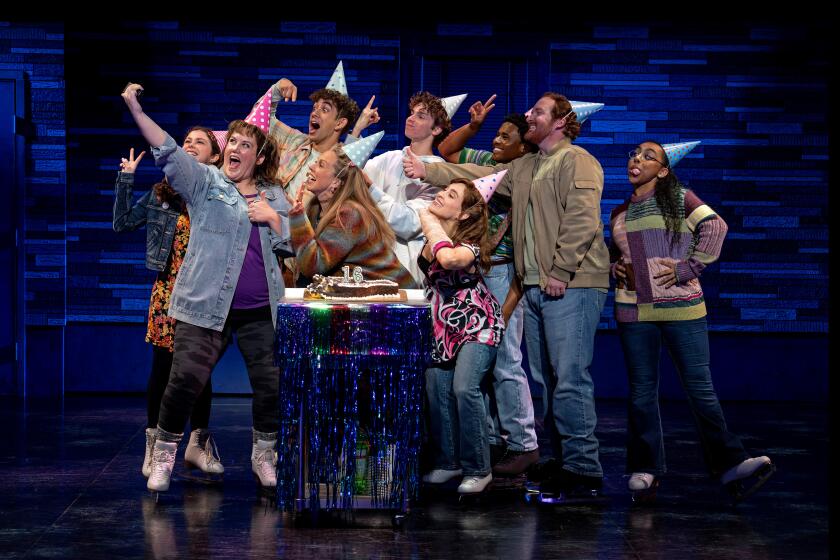STAGE REVIEW : Taking ‘Measure’ of Shakespeare’s Comedy
Solvitur ambulando, the Jesuits used to say--we’ll work it out as we go along. That seems to be director Adrian Hall’s approach to Shakespeare’s “Measure for Measure” at the Old Globe Theatre, and the results are surprisingly convincing.
Hall came to the production late, as a substitute for the ill John Hirsch (who died Aug. 1 of AIDS). A program note suggests that Hall not only didn’t have a concept for the show in his pocket, he didn’t know the play all that well.
But then, who does know “Measure for Measure”? This is one of Shakespeare’s iffiest “comedies,” a dish whose ingredients strike us as none too wholesome. Isn’t it comical the way the Duke (Richard Easton) sneaks around Vienna in his monk’s outfit, checking out everybody’s behavior once they think he’s gone?
Not when you see what it leads to, no. And not when you consider what the Duke’s real motives are. The city has become a moral stew, thanks to his own negligence. So he will pretend to go off to the country, let things go from bad to worse (in fact, assist them) and then magically appear to make everything right--to mete out justice and, of course, mercy.
And, incidentally, to get the girl. Machiavelli would have approved of this plot. Shakespeare seems to have his doubts, judging from his description of the Duke as “the Duke of dark corners” and from the many heavy-hearted passages about lust, poison, guilt and retribution.
Still he’s stuck with the comic mechanics of the play. Something feels uneasy and the golden note of comic forgiveness isn’t struck at the end of the play, although the motions are gone through.
How to stage “Measure for Measure”? An inch at a time. At least that is Hall’s solution. He gives each scene its due, and lets the audience decide where Shakespeare is writing to formula and where his heart is in it.
There are hints, of course, as to Hall’s opinion. The final scene where the Duke plays God is enacted on a floor made not of marble, but of plywood--and second-cut plywood at that. Up to now, set designer Ralph Funicello has made us believe in his Vienna, but here he allows us to see that it is a theatrical construct, and the implication can be transferred to the scene being played, if we wish.
Hall and his designers (Lewis Brown, costume; Peter Maradudin, lighting) don’t overdo this sort of comment. But we can see them lurking in the shadows, not unlike the Duke. Hall’s actors, however lack this sort of ironic double-mindedness. They go at their characters as if they believed in them.
Easton’s Duke absolutely adores hearing people’s confessions and getting them into trouble. It is almost as good as having a life of one’s own. A psychoanalyst might say that he is headed for a breakdown but for the moment he feels marvelously in touch with himself. For Easton’s Duke, “Measure for Measure” is definitely a comedy, perhaps even a puppet show. What fun to pull the strings!
For Stephen Markle as Angelo--the Duke’s second in command, on whom he gets the goods--it is a tragedy. A 1985 Mark Taper Forum “Measure for Measure” made Angelo a bore. Markle makes him fascinating--a sincere hypocrite. A “moral” man, merely because he has never been tempted to be otherwise.
Flooded suddenly by lust for the innocent Isabella, he finds himself astonished by the force of his emotions, including a cruelty more joyous than anything he has ever felt. This “angel” turns devil at a shot. Shakespeare’s heart is absolutely in these scenes, and Markle plays them with the truth of the damned.
Nance Williamson plays Isabella as a wise virgin who refuses to be shaken by what she has discovered about the perfidy of men--not only Angelo, but her own brother Claudio (a rather recessive Michael Cerveris). It’s a sensible performance, but it is hampered by a tendency to hammer out lines rather than thinking them through, a problem heard elsewhere in the cast as well.
Tempo is obviously one of Hall’s desiderata in this production. It sometimes leads to a runtogether text, as if the space bar had broken on a word processor.
This is not a problem with Easton, who phrases superbly, even if he does sometimes fall into Gielgudisms. And it is not a problem with James Winker admirably sleazy as the good-for-nothing boulevardier, Lucio. Winker is very much into the time frame of the show (Vienna in Freud’s day), as is Jeffrey Alan Chandler, whose Pompey suggests a dainty, nasty silent-film comic--Fatty Arbuckle, perhaps.
(Lewis Brown’s costumes are a great help here and also solve more complicated problems.)
The physical and psychological atmosphere is dark and repressive, with a sense that the barbarians are at the borders of the city. While the Duke fiddles, Vienna is on the point of burning. This “Measure for Measure” has room to make such a statement while also allowing the play as much laughter as it deserves to get.
Hall has said that he didn’t want to be a naughty boy in his first directing assignment after being fired as the artistic director of the Dallas Theatre Center, and he hasn’t been. But he has taken the measure of a naughty play.
Solvitur ambulando.
At the Old Globe in Balboa Park Tuesdays through Sundays, 8 p.m., with matinees Saturday and Sunday at 2. Closes Oct. 8. Tickets $14-$25; (619) 239-2255.
‘MEASURE FOR MEASURE’
Shakespeare’s comedy, at the Old Globe Theatre, San Diego. Director Adrian Hall. Scenic designer Ralph Funicello. Costumes Lewis Brown. Lighting Peter Maradudin. Composer Conrad Susa. Sound James LeBrecht. Dramaturge Diana Maddox. Stage manager Douglas Pagliotti. With Richard Easton, Jonathan McMurtry, Stephen Markle, Nance Williamson, Mary Kay Wulf, Ollie Nash, Allen Oliver, John Adam Morrison, Thomas S. Oleniacz, Matthew Edwards, Michael Cerveris, Hilary James, James R. Winker, Martha Perantoni, Blaise Messinger, Mark Guin, Kevin Fabian, Ellen Crawford, Jeffrey Allan Chandler, Richard Ortega, Dana Pere, Robert LaPorta, Albert Valdez, Barry Mann and Laura Rearwin.
More to Read
The biggest entertainment stories
Get our big stories about Hollywood, film, television, music, arts, culture and more right in your inbox as soon as they publish.
You may occasionally receive promotional content from the Los Angeles Times.










